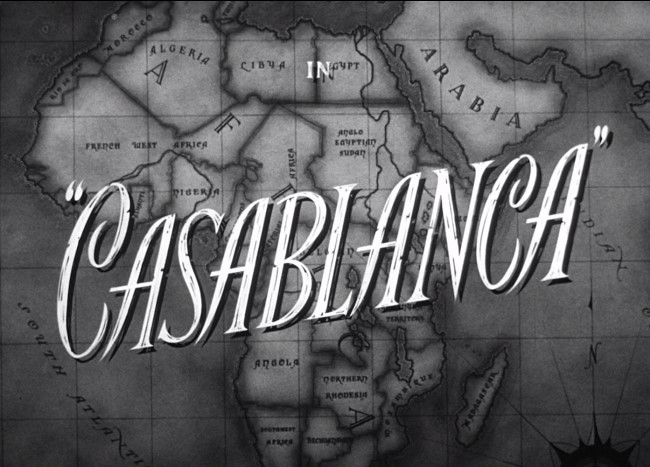
There's not a lot to say about one of the most written-about movies in film history, is there? Jen had to watch this for class, and when you watch a classic film with someone who hasn't seen it before, you get something like fresh eyes again, which is always a joy. So here, already familiar with the politics and the double- and triple-crosses, and the thematic and symbolic gestures throughout, I found myself focusing so much more on the straightforward emotional core of these characters. Bogart's performance is a lot more raw and emotional, dark and brooding, than I'm used to seeing from actors from that era or from an actor like Bogart. It's still a little affected, still very much Bogart playing Bogart, but scenes of him as a broken, bitter drunk facing the darkest place in his own heart really resound, and I couldn't help but be moved by his presence and energy. (And as I write this, Jen is listening to Ebert's commentary track to pass time, and I overhear talk of how this was Bogey's first step up from back-up gangster characters and into an A-list role that would make him one of the most identifiable movie stars of his or any time. So, that's cool. Well earned.)
While on the subject: I love Humphrey Bogart, I just love him, and I consider the best romantic co-star to pit against him Lauren Bacall, because she's got a kind of ball-buster fearlessness that bounces against Bogart's sensitive tough-guy behavior perfectly -- but here, against Ingrid Bergman, so much classier, so much more delicate and ladylike, and that her Ilsa can wreck Rick the way she does says more about who Rick was and how he became who he is than if he'd simply met a woman as jaded and cynical as he is, like Bacall.
My favorite thing about this film is the same as most people: the relationship between Renault and Rick, the back-and-forth of the sleazy corrupt official and the noir anti-hero club owner, each of whom hide their own self-confessed "sentimentalism" underneath cynicism and opportunism. They are such different characters, and yet so the same, and in the end Renault is clearly not meant to be merely the "consolation prize" for Rick, who lets Ilsa go. If we accept that Rick is the man "Richard" was changed into by heartbreak, then Renault and Rick are soulmates in just the way Ilsa and "Richard" once were. If the film allowed Rick and Ilsa to escape together, it would do a disservice to the progression of change Rick has undergone between the flashback and the start of the story, and would cheapen the nature of his character into some bland rose-colored tripe. But no, here love can break your heart, and your heart can't always be unbroken -- and this story is Rick's, not Richard's, and such a huge part of it is accepting that who he is now is more than just the shell of a man once named Richard. Accepting himself as Rick and accepting his new soulmate, Captain Renault, is a beautiful and crucial turn for the character: a step forward, not a step backward. Plus, it's the American bucking up and saying, I can't stay neutral forever; time to fight. Considering the exact timing of the film, it's hard not to take that into account. But watched now, almost seventy years later, it's the drama and character that resonate today more than the political activism.
I don't know what else to say. I mean, this is a great movie, just a nice beautiful film that does everything right. Maybe watching this -- one of the most respected pieces of populist art ever, a film that didn't aim to redefine cinema or push any boundaries but just managed to have a near perfect storm of talent, skill, and drama -- should put a slightly different spin on my recent rant about 2010's film output being unambitious. I'm not sure it entirely does (after all, I never claimed that unambitious was bad; I just missed the joy of films ambitious enough to aim for greatness), but it definitely reminds me that you don't have to transcend form in order to be transcendently good.

No comments:
Post a Comment